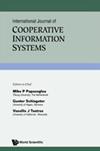The Reclamation of Whānau Decision-Making in the Context of Child Welfare. A Case Study of Iwi-Led Family Group Conferences
IF 0.8
4区 计算机科学
Q4 COMPUTER SCIENCE, INFORMATION SYSTEMS
International Journal of Cooperative Information Systems
Pub Date : 2020-09-23
DOI:10.5204/ijcis.v13i1.1575
引用次数: 2
Abstract
The Children, Young Persons and Their Families Act (1989) heralded family group conferences as an innovative mechanism to reinforce the role of family in child welfare decision-making. While many have regarded family group conferences as a culturally appropriate response, continued managerialism reflected a guise of cultural responsiveness and family involvement that has actively disempowered whānau and the young person in decision-making processes. Similar to concerns that led to the formation of the 1989 Act, institutional racism inspired Rangitāne o Wairarapa (Rangitāne) to reclaim the family group conference process, and child welfare decision-making, as an iwi function. The current study reports on the development of a family group conference practice model of one iwi (Rangitāne) as a case study of cultural reclamation. The success of the approach is juxtaposed against the iwi practice model, critical success factors and opportunities for the development of such practice models across Aotearoa New Zealand.儿童福利背景下Whānau决策的再造。iwi领导的家庭小组会议个案研究
《儿童、青年及其家庭法》(1989年)宣布家庭小组会议是加强家庭在儿童福利决策中的作用的一种创新机制。虽然许多人认为家庭小组会议在文化上是一种适当的反应,但持续的管理主义反映了文化反应和家庭参与的幌子,这在很大程度上剥夺了whānau和年轻人在决策过程中的权力。与导致1989年法案形成的担忧类似,制度性种族主义促使Rangitāne o Wairarapa (Rangitāne)重新将家庭小组会议过程和儿童福利决策作为iwi的功能。目前的研究报告了一个iwi (Rangitāne)的家庭小组会议实践模式的发展,作为文化回收的案例研究。该方法的成功与iwi实践模式,关键成功因素和发展这种实践模式在新西兰奥特罗阿的机会并列。
本文章由计算机程序翻译,如有差异,请以英文原文为准。
求助全文
约1分钟内获得全文
求助全文
来源期刊

International Journal of Cooperative Information Systems
工程技术-计算机:信息系统
CiteScore
2.30
自引率
0.00%
发文量
8
审稿时长
>12 weeks
期刊介绍:
The paradigm for the next generation of information systems (ISs) will involve large numbers of ISs distributed over large, complex computer/communication networks. Such ISs will manage or have access to large amounts of information and computing services and will interoperate as required. These support individual or collaborative human work. Communication among component systems will be done using protocols that range from conventional ones to those based on distributed AI. We call such next generation ISs Cooperative Information Systems (CIS).
The International Journal of Cooperative Information Systems (IJCIS) addresses the intricacies of cooperative work in the framework of distributed interoperable information systems. It provides a forum for the presentation and dissemination of research covering all aspects of CIS design, requirements, functionality, implementation, deployment, and evolution.
 求助内容:
求助内容: 应助结果提醒方式:
应助结果提醒方式:


